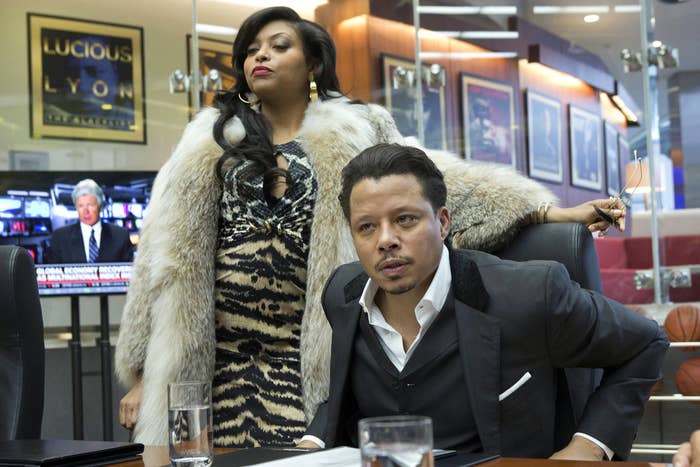
Ira Madison III: I've really enjoyed the different shades of blackness that we've seen on television this year thus far, and Empire has contributed to that. The Lyons are completely different from the family on Black-ish, or Gabrielle Union on Being Mary Jane, etc. After all, this is the first time we've gotten to see a glossy soap with black people in it (aside from the sorely missed Generations), and white versions of this show have existed for decades. Prestige dramas on cable are great, but for something this great to be on network television is much more important, I think, since it's "for everyone" and less niche. By putting a new type of representation of blackness on television in American homes every Wednesday night in primetime, the landscape of television will surely have to change. It's not just some HBO show. It's a high-rated network television show that mainstream America is watching in increasing numbers each week. But, for all the good that's come from and will hopefully continue to come from Empire, I've also seen some typical colorism creeping in. Anika (Grace Gealey), for instance, really just turned out to be a Tyler Perry archetype of the scheming light-skinned woman.
Kelley L. Carter: I'm very sensitive to images of light-skinned versus dark-skinned portrayals in television and film, and when I heard someone mention that in regard to Empire, it threw me back a bit. I get it. Anika is this light-skinned woman who comes from an upper-class upbringing, and therefore, she's evil! That said, what I've largely noticed in Tyler Perry pieces is that it's not just the light-skinned women who are evil — it's black women generally speaking who want to escape economic strife or black women who haven't experienced being downtrodden and are awful to those in less-than-ideal situations. In Perry's movies, the latter set of women usually have something horrible happen to them or it's clear that they're evildoers who get something (like an STD) they can never come back from. And I just don't feel that Empire reinforces that narrative in the same way. That said, it does stand out that the dark-skinned people in the TV series are the worker bees; I'm not sure how I feel about that just yet, though?
Saeed Jones: Something I've been thinking about regarding colorism on Empire is how whiteness is perceived by the many of the Lyons as evil. Lucious (Terrence Howard) cited Andre (Trai Byers) marrying Rhonda (Kaitlin Doubleday), a white woman, as one of the reasons he knew he couldn't really trust his son. "I knew the moment you brought her into my house," he says. Her very inclusion in the family is perceived as a betrayal. I bring this up because I wonder if it connects to how colorism functions on the show. Despite the show's contemporary setting, Anika's character is surprisingly retrograde: She is the "evil mulatto" who can't be trusted because her identity itself — her father is white, her mother is black — is constructed as a racial betrayal. Her final betrayal is when she literally leaves Lucious to work with a white man — Lucious' longtime rival Billy Baretti (Judd Nelson).
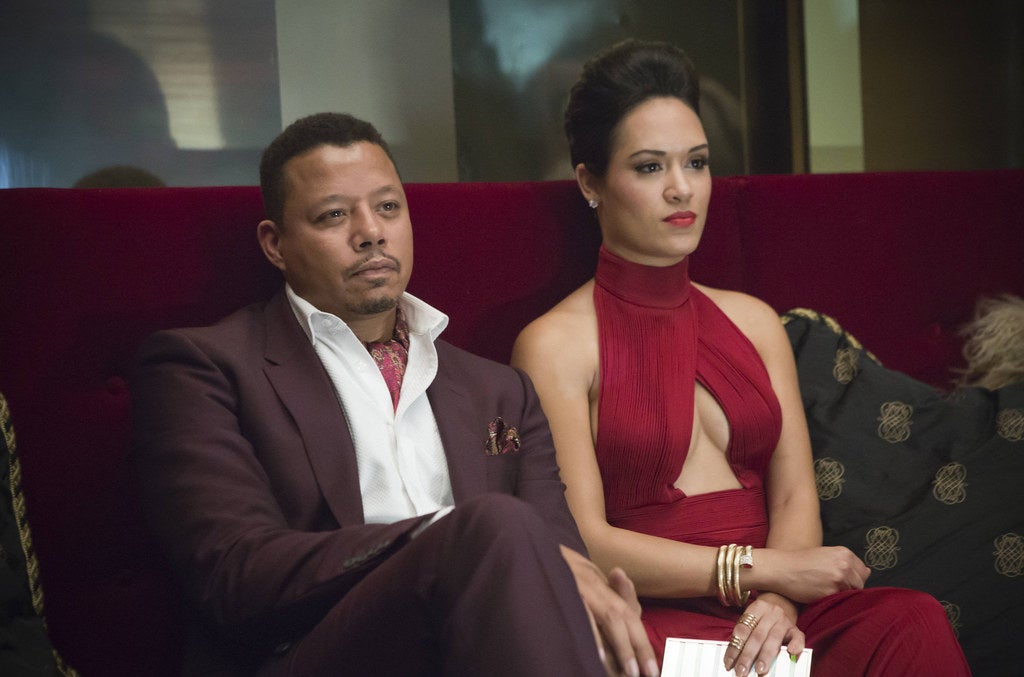
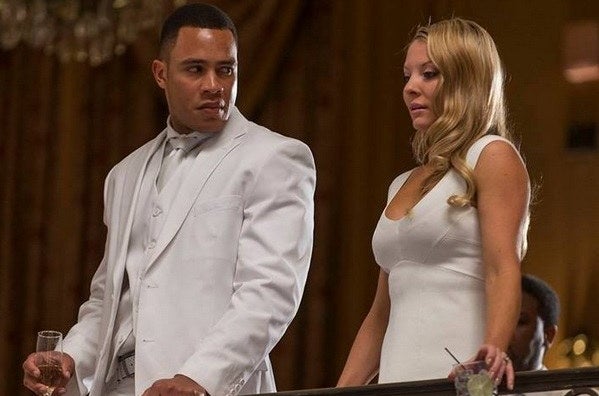
IM3: What I found interesting about white people on the show is the fact that they're sort of the "enemy" as far as Lucious, in the same way he sees gay people in regard to Jamal, and mental illness in regard to Andre. He practically hates Rhonda, but we get some character development from her where she explains, "I worked for everything I have." Contrast that with him having no problem being with Anika, a mixed-race woman, because she's at least part black, perhaps? It's also odd that, for someone so antagonistic to the white world, we see that some of the white people who work at Empire are, like, a little too familiar. Like when Elle says she's running on "CP time" and that white guy in the episode where Anika leaves says he doesn't want to feel like a "sharecropper." I wonder if they're merely just writers room jokes that seem funny in the moment or if they're just supposed to be a signifier of casual racism?
KLC: The sharecropper line could have been a throwaway line (and it was delivered as such), but no. Because most of the writers room on Empire is black, I read that as a "for-us-by-us" line. At this point, the writers know how socially engaging Empire is, and it was one of those moments where if you heard it, you tweeted about it or posted on Facebook and had a long (likely humorous) back-and-forth conversation about it. One of my favorite moments was when Cookie (Taraji P. Henson) was kicking Anika out of the house and yelled "phone check!" at her. It's a small, in-the-know prison term that only a small section of people will get and laugh.
SJ: As is often the case with many of Cookie's instant-classic lines — "Shut up, Dora!" — I scream-laughed at "phone check!" It's so specific. The writers have done a wonderful job of using throwaway lines to develop her character. And more broadly speaking, the delight of those moments is one of the reasons why diverse representation on-screen combined with more people of the color in the writers room really pays off. The relationship between television shows with diverse casts and the impressive driving power of conversations on platforms like Twitter and Tumblr gives would-be throwaway lines, facial expressions, and lingerie reveals a whole new staying impact. In this way, Empire is definitely building upon the example set by the Shondaland shows.
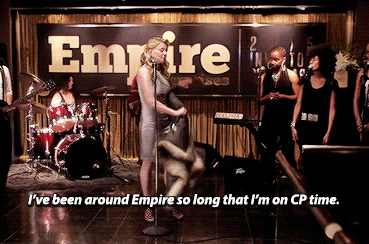

IM3: Those sound bites just seem random to me because no one responded to the sharecropper line and I was like, ooohkay. At least when Elle said "CP time," the black backup singers gave her this "excuse me?" look. But there's a lot of lines that sort of dig into generalities. And as a gay black man, I find that the ones I'm most thrown by are the "there's a lot of homophobia in the black community" lines. I rewatched the pilot and Jamal mentions that to his boyfriend/failed character Michael (Rafael de La Fuente) and then again to filmmaker-turned-boyfriend Ryan (Eka Darville). And it's just weird because, is Lucious supposed to represent the black community at writ? Jamal is young, black, gay, and my age. He should know, as an artist, that there are plenty of gay black people and most of the artists we know and love who are black are also gay. I could see someone else bringing it up as a generality, but it's also weird coming from Jamal, because he's of the age that knows how damaging it is to say the "black community" is homophobic. Every community has homophobia in it. I don't want to stop Lee Daniels from telling his story, obviously, and it's not out of place for someone to have that opinion. But for the educated gay black male in his twenties to say that like, you're living in an age where white politicians are constantly stripping gay people of their rights and you have lines like "the black community is homophobic"? Like, bye, Usher 2.0.
KLC: I actually am intrigued seeing this particular storyline play out on a network show. We haven't seen the issue of homophobia in the black community portrayed quite like this, and I also think that some of us — well, I do — live in a world that is very diverse and accepting and open, but that's the world of my choosing. When I am in a room of people who aren't in my circle, I hear the salty language and think there IS a large problem with being able to be black and be gay. Am I off here? Or is it that you think Jamal's experiences are those of, say, the generation before him? To me, I thought that this show would help to restart a conversation of acceptance, but it seems like you think it's overblown?
IM3: Lee Daniels is 55. And I know many of the things in the show are inspired by his life. He would have been dealing with his relationship with his father in the '70s/'80s. The garbage-can scene felt real and visceral, but current-day Lucious feels like he's from a completely different time period, which makes sense, because that's what Daniels is drawing upon.
So, yes, I feel like Jamal is written from the perspective of someone in an older generation, if we're being perfectly honest. I just think a contemporary young black man in the social media age would be more enlightened. Obviously, there's still homophobia to be found within our community. But I'm also from Milwaukee, Wisconsin. I could go hang out with some white classmates from high school who would make homophobic comments too, but the media doesn't portray white homophobia in the same way as black homophobia. And if I know this, I'd just think Jamal would too? There are other moments where he feels less than contemporary too, like when he doesn't tell Sway that he's gay during that interview. Girl, the pilot is all about you hanging out in Brooklyn and San Francisco with hipsters and there's nothing on the internet about you being gay already? Like, what WORLD is Jamal really living in?
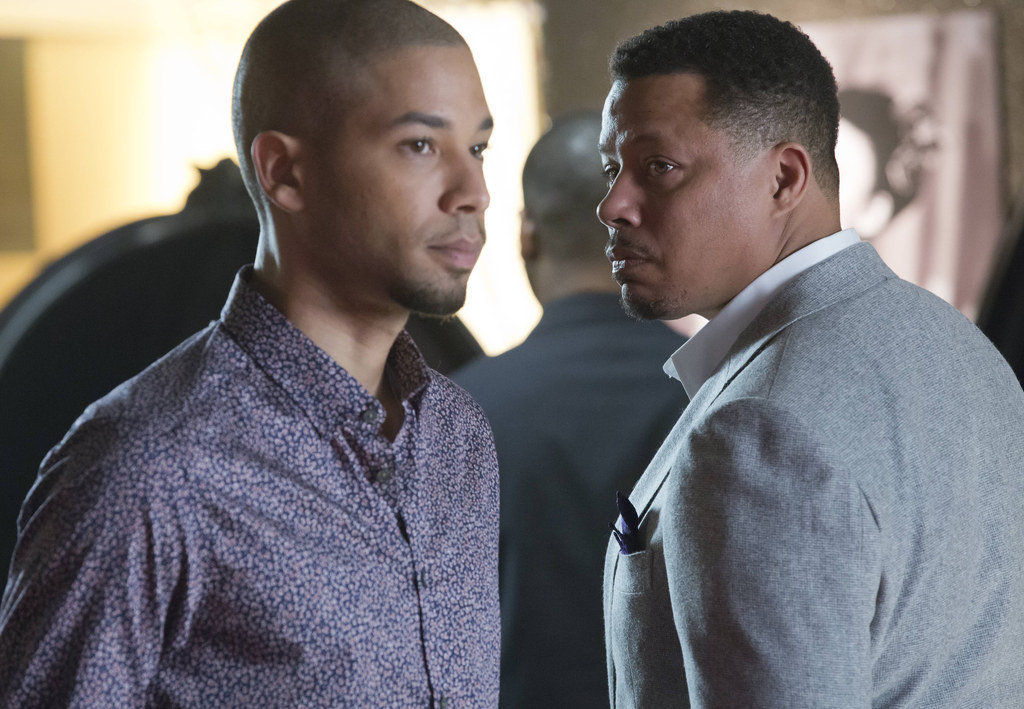
SJ: The way Lucious' homophobia is written strikes me as annoyingly retrograde too. It's like he is living in a different decade from everyone else on the show. Who — except for radio hosts and Al Sharpton — talks about "the black community" in regular conversation as frequently as Lucious? And, as an aside, he hates gay people so much but owns several of Kehinde Wiley's larger-than-life portraits. I crack up every time one of the paintings appears. Lucious doesn't realize just how out of touch he is with reality: 10-foot-tall paintings by a gay black man are looming over his head as he lectures his son about how the black community cannot survive the existence of homosexuality.
IM3: YES. Lucious is friends with Barack Obama (which, LOL), and Obama is out here quoting James Baldwin in speeches. So…how deep is that friendship? Lucious is a rich black man. I could see him being written the way he is if he were, like, Joe Budden's Twitter account. But he's not.
KLC: Y'all are killing me. I don't think that most people are watching the show and realizing that about the Wiley paintings. Hell, Lucious likely doesn't realize who Wiley is. He strikes me as the type of dude who just wants to look the part anyway. You feel me?
SJ: Well, as it's been about three minutes since I last threw shade at an unwitting subject, let me point out here that Kehinde Wiley's work is often criticized for being too marketable. The portraits are social currency. Lucious is absolutely the kind of man who would buy Wiley's paintings not because of artistic appreciation so much as a desire to surround himself with work as egotistical and self-indulgent as himself.
KLC: Which makes him the prototype of an excellent primetime soap character, if you ask me. Undeniably, we've never seen black people like this on network television, and it's about time. It's as delicious as programs like Dynasty and Dallas, and their influence is peppered all throughout the series.
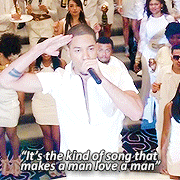


IM3: Absolutely. If there's one positive takeaway from Jamal, it's his introduction to mainstream black America. Part of the reason the homophobia-in-the-black-community myth persists is because of representation. We've seen some of television's most popular series dealing with the gay son soap archetype, and the image of gayness and acceptance of homosexuality has permeated white culture for nearly 50 years (Susan Harris' 1977 satirical sitcom Soap introduced one of television's first gay characters in Jodie Dallas). Black characters who appeared on these kinds of soaps were the divas like Dominique Deveraux (Diahann Carroll's character on Dynasty) or Wilhelmina Slater (Vanessa Williams' character on Ugly Betty). They rarely had lives of their own. And here we are now, with Jamal fighting for his father's dynasty. If this show had existed in the '80s — as it should have, because black people had money in the damn '80s too and we loved soap operas back then — I truly believe the notion of a black community being more homophobic would be retrograde. But look at Empire's ratings. They're huge and growing each week. In the '80s, Dynasty was one of the highest-rated dramas on television. Jamal's character, however I may feel about him, is important not just for our community but in the context of television history in general.
SJ: It's burned.
KLC: Literally laughing out loud. Aside from Jamal's character, we're also introduced to a very different type of primetime soap diva in Cookie. She's a woman with a sordid past who doesn't bite her tongue, gets the best one-liners, and has a Lil' Kim–meets–Dominique Deveraux fashion sensibility. She's not "bougie," as she refers to Anika; she's been through some shit. And she still keeps her alliances to the street close by. You almost never forget that she's been to prison.
IM3: Yes, like I mentioned with Dominique, we're getting a new kind of a soap diva with Cookie. Women like Alexis Carrington (Dynasty), Amanda Woodard (Melrose Place), and Erica Kane (All My Children) all gave us the modern woman who took no prisoners when it came to business and getting what's hers. When we've seen that portrayed in black women, they're often loveless or evil. Cookie is giving you a soap diva who is not a stereotypical "strong black woman." She's a complex black woman. She doesn't take shit, she dresses fly, she's managing artists at Empire, AND she's certainly not lacking for love or male companionship just because she's ambitious.
SJ: One of my favorite scenes thus far featured Cookie in the back of a car alternating between calls from three or four people, all of them in crisis. She handled one problem after another seemingly effortlessly then put away her phone and turned to look at her sister, sitting next to her in the backseat. They smiled at each other with a slight air of "What would all these men do without me?" It was so great. There is so much to love about Cookie, but I'm most in love with her when she is working.
When she walks into the nightclub with Jamal, intent on promoting his new song, she says, "Now let me work my magic," and then wades into the crowd like a true huntress. I live for those moments. Much like her character, the ambition with which Taraji P. Henson seizes upon every scene and opportunity electrifies everyone she engages.
Empire is a complicated and at times conflicted show, but there is no doubt that it is a perfect vehicle for actors like Henson. Her success aligns with the show's breakout velocity. And that's great news for her as well as for viewers hungry for a show just as vivid, thrilling, and soulful as the culture Empire valorizes.